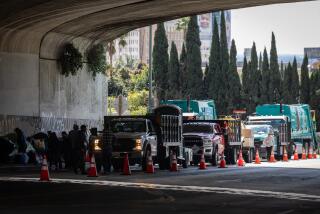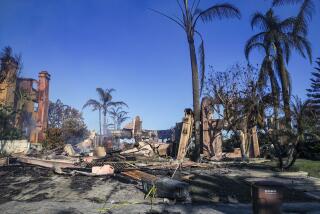Fighting fire with money
If people whose homes border wilderness areas paid the real expenses for their way of life, the bill would be daunting. Maintaining a local fire crew capable of defending those homes against catastrophic wildfire is more than municipalities can manage. So taxpayers throughout the state have been picking up most of the tab by paying for Cal Fire, the state firefighting force that has primary responsibility for responding to blazes in wildfire-prone areas and brings in big, expensive equipment such as water-dropping aircraft. In effect, the state as a whole is subsidizing the choices of those residents.
Finally, however, a new law has been passed that levies a $150-a-year fee directly on homeowners who live in these areas, known as state responsibility zones. It’s about time. Cities and counties have done well for themselves by allowing housing in brush-adjacent habitats. They rake in the extra property taxes without paying for the necessary extra fire services to cover such development. Homeowners in some areas — most notably San Diego — have added to the problem by refusing to pass taxes for local fire service.
Residents of the urban/wilderness interface argue that just as their fire services cost more than average, certain urban areas have higher police costs because of their crime rates, yet no one is asking residents of those communities to pay more. This argument overlooks two realities. Local police and sheriff’s departments fight such crimes, not a state police force that everyone pays for (although it is true that prisons are the responsibility of all state taxpayers). And living in a high-crime urban area is not a choice by most residents there.
The new law will face legal challenges that claim it imposes a tax, not a fee, and thus should have required a two-thirds vote of the Legislature to be approved. That’s not how it looks to us. Fees are levied on those who use a particular public service, just as this $150 charge is. It’s also in the best interests of the residents; it would be terrible to see cuts to Cal Fire imperil homes and lives.
The Legislature and Gov. Jerry Brown should continue to pursue options for limiting further sprawl into these areas. When that has been proposed, however, it has been quickly squelched by the term “job killer.” In truth, allowing such sprawl merely subsidizes one kind of job — private construction — over others. Because the financially strapped state spends millions on protecting the homes of a relative few, it cannot spend the money on teachers, librarians and social workers.
More to Read
A cure for the common opinion
Get thought-provoking perspectives with our weekly newsletter.
You may occasionally receive promotional content from the Los Angeles Times.






